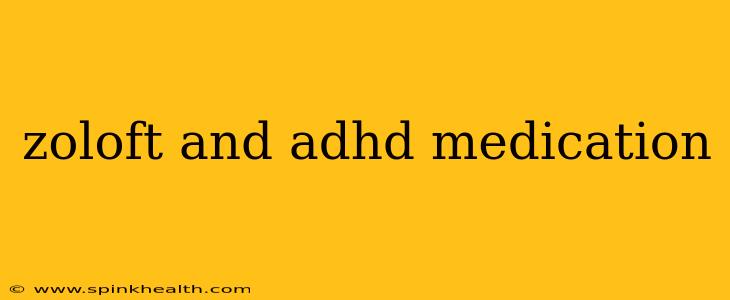Zoloft and ADHD Medication: A Complex Relationship
The intersection of depression and ADHD is surprisingly common. Many individuals find themselves navigating the challenges of both conditions simultaneously. This often leads to the use of both Zoloft (sertraline), a selective serotonin reuptake inhibitor (SSRI) antidepressant, and ADHD medication, typically stimulants like methylphenidate (Ritalin) or amphetamine (Adderall), or non-stimulants like atomoxetine (Strattera). While this combination can be effective, it's a complex one requiring careful management and close monitoring by a healthcare professional. My experience, as a long-time advocate for mental health awareness, has shown me the importance of understanding this interplay.
Let's delve into the common questions and concerns surrounding this medication pairing:
Can I take Zoloft and ADHD medication together?
Yes, it's entirely possible, and often necessary, to take Zoloft and ADHD medication concurrently. Many individuals find that this combination effectively manages both their depression and ADHD symptoms. However, it's crucial to have a doctor carefully manage this combination. They'll help determine the right dosages and monitor for any potential interactions or side effects. Think of it like a finely tuned orchestra; each instrument (medication) needs to be played at the right volume and in harmony for optimal results. Rushing this process or attempting self-medication can lead to serious problems.
What are the potential side effects of taking Zoloft and ADHD medication together?
Combining these medications can potentially increase the risk of certain side effects. These may include increased anxiety, insomnia, nausea, decreased appetite, and even cardiovascular issues in some cases. The severity and type of side effects vary greatly depending on individual factors, the specific medications used, and their dosages. The key here is open communication with your doctor. If you experience any unusual or concerning symptoms, report them immediately. Don't suffer in silence; your well-being is paramount.
How do Zoloft and ADHD medication interact?
Zoloft and stimulant ADHD medications primarily affect different neurotransmitter systems. Zoloft primarily increases serotonin levels, while stimulants increase dopamine and norepinephrine levels. While these systems are interconnected, the exact interactions can be complex and vary from person to person. The careful monitoring by your doctor helps mitigate potential negative interactions and optimize the therapeutic benefits. It's a delicate dance, requiring expertise and ongoing adjustment.
Does taking Zoloft affect the effectiveness of ADHD medication?
The impact of Zoloft on ADHD medication effectiveness is not fully understood and can vary significantly between individuals. Some people report no noticeable impact, while others might find that Zoloft slightly reduces the effectiveness of their stimulant medication. It's all about finding the right balance, and that's where a healthcare professional's guidance is vital. They can adjust dosages or medication choices to ensure optimal symptom management.
What if I experience side effects?
If you experience any bothersome side effects, it's crucial to reach out to your prescribing physician immediately. They can adjust dosages, suggest alternative medications, or provide strategies to manage side effects. Never stop taking medication abruptly without consulting your doctor – this can lead to withdrawal symptoms or worsen your existing conditions. Your doctor is your partner in this journey; communication is key to success.
Conclusion:
The combination of Zoloft and ADHD medication can be a powerful tool for managing co-occurring depression and ADHD. However, it requires a careful and personalized approach under the guidance of a healthcare professional. Open communication, regular monitoring, and a willingness to adjust treatment strategies are crucial for achieving optimal results and minimizing potential risks. Remember, your mental health journey is unique, and finding the right treatment plan is a collaborative process. Never hesitate to seek support and guidance from qualified professionals.

